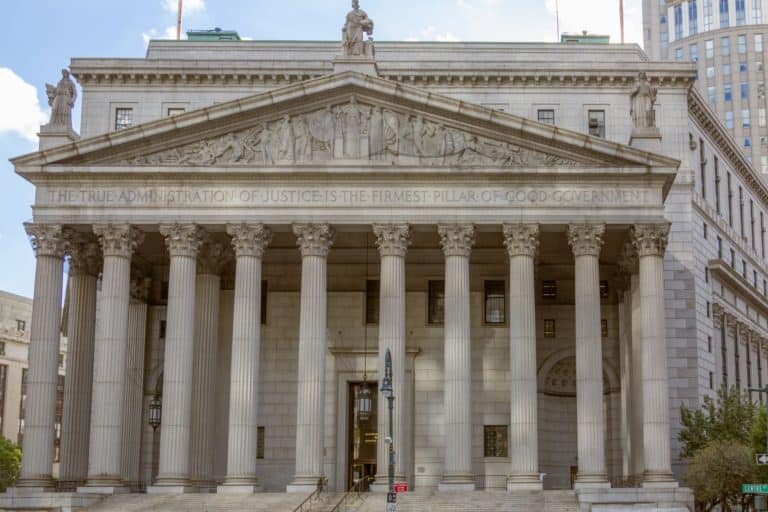
Jeffrey Vogt is the Rule of Law Director of the Solidarity Center and Co-Founder and Chair of the ILAW Network. He is also a member of the ILO Governing Body and of the ILO Committee on Freedom of Association.
Since 1919, the International Labor Organization (ILO) (now a UN specialized agency) has been setting global labor standards through a unique, tripartite process that involves not only governments but worker and employer organizations. Further, workers and employers also assist in the supervision of these standards through their participation in various committees. However, disputes over the interpretation of a convention occasionally arise and may eventually require judicial intervention. Per the ILO Constitution, this means a referral to the International Court of Justice (ICJ).
It is not every day that questions of labor law are put to the judges of the ICJ for an advisory opinion. In fact, the last time was in 1932, when the ILO sought an advisory opinion concerning the interpretation of the Night Work (Women) Convention, 1919 (No. 4), namely whether the convention excluded women who hold positions of supervision or management. The question this time, nearly a century later, goes to a fundamental issue of collective rights, namely, “Is the right to strike of workers and their organizations protected under the Freedom of Association and Protection of the Right to Organise Convention, 1948 (No. 87)?” Convention 87 is the ILO’s principal convention on the right to freedom of association. On October 6-8, 2025, the judges of the ICJ heard oral arguments from the ILO, worker and employer representatives and several governments, with the workers and a large majority of governments urging the Court to answer the question in the affirmative. Together with the written statements and comments filed in 2024, the ICJ will consider the arguments and issue an advisory opinion sometime in early 2026. Fortunately, as I and others have argued, the answer to the question must be a resounding “yes.”
That this matter is even before the ICJ is the result of the employer representatives to the International Labor Conference of 2012 denying that the right to strike was ever protected by ILO Convention 87 — even though they had recognized that it did for decades (if sometimes objecting over the exact scope of the right as developed by the ILO’s independent Committee of Experts). The change of heart appears to be motivated not by the late “discovery” of some legal “error” by the ILO, but rather by the broadening acceptance of ILO conventions and the attendant jurisprudence of the ILO supervisory system, as persuasive authorities by various national high courts, regional human rights courts and other UN bodies, as well as their incorporation into trade and investment agreements and laws and guidelines governing the conduct of multinational enterprises. As ILO conventions escaped the confines of Geneva and began to have real world consequences, the move in 2012 to deny the right to strike was an attempt to stuff the genie back into the bottle.
As the ITUC argued in its written submissions and at oral argument, although the word “strike” does not appear in the text of Convention 87, the right to strike has always been protected by it — a view confirmed through the application of the customary rules of treaty interpretation enshrined in Articles 31 and 32 of the Vienna Convention on the Law of Treaties. Article 31(1), provides that, “A treaty shall be interpreted in good faith in accordance with the ordinary meaning to be given to the terms of the treaty in their context and in the light of its object and purpose.” Articles 2, 3 and 10 of Convention 87, when read together, make plain that the workers organizations have the right “to organize their administration and activities and to formulate their programmes… for furthering and defending the interests of workers.” There is no limitation to the activities and programs other than the instruction in Article 8 that they be undertaken in accordance with the “law of the land” so long as such laws do not impair the guarantees provided for in the convention. In light of the fact that all parties negotiating the convention agreed that it should set forth essential principles and not detailed regulation, it is difficult to explain why only the right to strike be excluded from the activities and programs of unions. Moreover, when considered in the context of industrial relations, and especially industrial relations of the early 20th Century, that the right to freedom of association would exclude the right to strike would appear difficult to support. Given that the object and purpose of freedom of association, as stated explicitly in its preamble, was to be a “means of improving conditions of labour and of establishing peace”, this would appear unachievable if workers had no leverage at the bargaining table.
That this was the original intent is perhaps best confirmed by the fact that the original members of the first Committee on Freedom of Association (CFA), most of whom also negotiated Convention 87, found that the right to freedom of association protected the right to strike as early as 1952. As such, this is not the case that an absent right was subsequently read into the convention under a “living instrument” theory of treaty interpretation, but that it had always been there.
In the intervening years, the ILO Committee of Experts has interpreted and applied Convention 87 to address limitations on strike activity, while the CFA has developed the constitutional principle of “freedom of association” as well as the same term under Convention 87. Commissions of Inquiry, the highest level of scrutiny available under the ILO constitution, have similarly explained that limits on the exercise of the right to strike which impaired the guarantee of freedom of association violated the convention. Outside of the ILO, other UN bodies, human rights courts and national courts have all reaffirmed that the right to strike is protected by the right to freedom of association as protected in their own instruments, drawing from Convention 87.
The employers largely rest their case on the preparatory materials during the negotiation of the convention. However, to the extent concerns were raised by governments, a careful reading shows that they were concerned with the right of civil servants to strike, not the right to strike generally. Indeed, in raising the possibility of restricting the right to strike to civil servants, this would indicate that the right to strike was assumed to be protected by the prospective convention. However, recourse to supplementary means such as preparatory materials is only available if the interpretation of the text under Rule 31 leaves the meaning ambiguous or obscure or leads to a result which is manifestly absurd or unreasonable. Neither is true here.
The ICJ’s opinion will be consequential for the ILO and of course for workers and trade unions around the world. Will the Court take a radical approach and upend industrial relations around the world, or will it take a conservative approach and simply confirm the consistent view of the ILO? We will soon know.










Daily News & Commentary
Start your day with our roundup of the latest labor developments. See all
February 6
The California Supreme Court rules on an arbitration agreement, Trump administration announces new rule on civil service protections, and states modify affirmative action requirements
February 5
Minnesota schools and teachers sue to limit ICE presence near schools; labor leaders call on Newsom to protect workers from AI; UAW and Volkswagen reach a tentative agreement.
February 4
Lawsuit challenges Trump Gold Card; insurance coverage of fertility services; moratorium on layoffs for federal workers extended
February 3
In today’s news and commentary, Bloomberg reports on a drop in unionization, Starbucks challenges an NLRB ruling, and a federal judge blocks DHS termination of protections for Haitian migrants. Volatile economic conditions and a shifting political climate drove new union membership sharply lower in 2025, according to a Bloomberg Law report analyzing trends in labor […]
February 2
Amazon announces layoffs; Trump picks BLS commissioner; DOL authorizes supplemental H-2B visas.
February 1
The moratorium blocking the Trump Administration from implementing Reductions in Force (RIFs) against federal workers expires, and workers throughout the country protest to defund ICE.